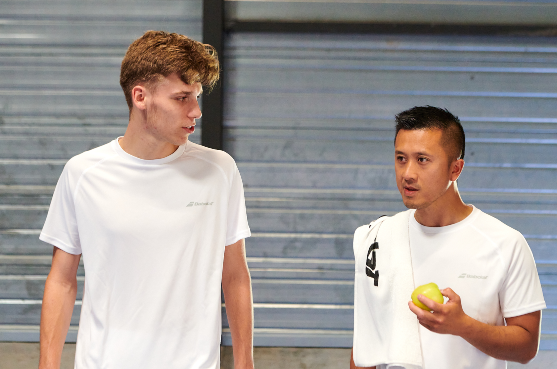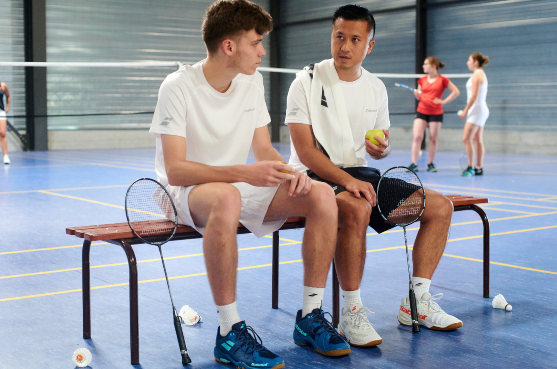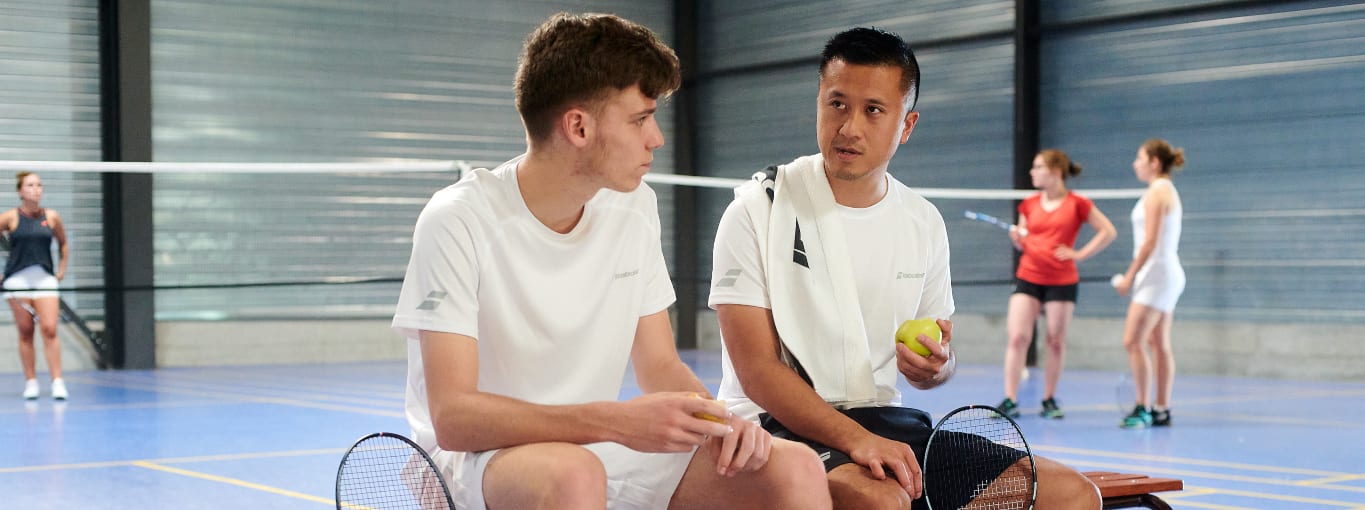Eat well to stay in shape? It’s easier (and more effective) than you think. Our sports nutrition expert Tom Hill shares his tips and tricks to boost your game.
● What to eat to up your game
● When to eat
● Homemade snacks
Nutrition can make a big difference to your game, just as each activity - competitions, high-intensity training sessions, or friendly knock-abouts – makes different demands on your body. Our expert, sports nutrition graduate and business owner of Hillsnutrition, Tom Hill, gives us the lowdown on how to adapt your diet to your goals.
Food for badminton: a major factor
Since a healthy diet can fuel muscles during exercise, promote post-training muscle repair, and improves your long-term performance, badminton players need to eat well to play well.
Tom suggests adapting what you eat to what you do: "The more intensive the training session or competition, the more carbohydrates you need to fuel your muscles. The less intensive the session, the smaller the requirements of carbohydrates are because the body has a greater shift of using more lipids (fats).”
If you struggle to consume the quantities required for your goals, then supplement both with protein to repair and grow targeted muscle groups, and vitamins to boost performance.
And it’s not just professionals who benefit from the badminton diet. All players need the same nutrition, but in different quantities. A few small changes to your diet can make a big difference on and off court.
Performance foods
Varying between whole grain cereals, fruit and veg, dairy, nuts and seeds, meats and fish is a good start… Badminton nutrition plans look like hard work! Luckily, Tom is here to help.
To kick things off, he advises eating carbohydrate-rich products such as “rice, potatoes, sweet potatoes, pasta, cereals and breads" for high-intensity training or competition matches.
Fruit is vital to “top up carbohydrate intakes to digest into the glucose we utilise during exercise”, and Tom suggests carbo-packed fruit like grapes, raisins, prunes, dates and bananas for high-intensity days.
For lower-intensity sessions, opt for lipid-rich “seeds and nuts like almonds, cashews, walnuts, pumpkin seeds and hazelnuts, olive oils, and fatty fish such as mackerel, salmon, herring, and sardines.”
And don’t forget protein for muscle growth and repair. “If you have several sessions lined up, eat white meat because it’s lower in fat but if you have just one session opt for meats or fish high in fats - salmon” Vegetarian? No problem! Simply swap meat for dairy products and eggs. There are also plenty of animal substitutes for vegans: pulses, bean-based products, tofu, soy, and lentils all do the job. Ensure you mix a good range of vegan sources to ensure your body has a good quality protein intake.

Meals and snacks: when and how much
Tom advises players to stick to 3-5 meals a day with a snack before, during, and after training. If you haven’t had time to focus on your pre-match or pre-training meal don’t panic: your overall nutritional intake is superior to just one meal: "Think 24 hours before, 24 hours during, and 24 hours after exercise to fuel and recover from any exercise"
● Prepare the right meal for your weight: 1.2-4g/kg carbohydrates, 0.3g/kg proteins, and 0.1g/kg from healthy fats, if possible two-four hours before physical exercise
● During exercise, 30g to 60g of carbohydrates per hour if exercise is of high intensity
● Consume carbohydrate and protein after exercise to recover
No time for sums? Try Tom’s plate hacks:
● For high-intensity sessions: one quarter protein, one quarter vegetables, and half carbohydrates
● For low-intensity sessions: one quarter protein, one quarter carbohydrates, and half vegetables
Expert snack recommendations
Tom suggests badminton players eat different types of snacks to supplement their daily meals.
The first type of nutritional snack is what he calls the "energy booster", in other words, carbohydrates found in "cereal bars, oat bars, and fruit including; dried fruit, banana, apple, kiwi, grapes.”
Next, protein snacks such as "dried meat, eggs, tuna, protein powder, protein bars, milk, and yoghurt.” Lastly, snacks rich in healthy fats such as "nuts, seeds, and eggs".
For snacks that really hit the spot, go homemade, says Tom: "You can make your own bars simply by mixing cereal, dried fruit, with honey and oil and place it in an oven pan for 10 to 20 minutes.”
Supermarket cereal bars are often sugar-heavy and can have a lot of additives. With homemade snacks, you know exactly what you’re getting and can control the sugar intake!
A badminton diet is about more than eating a balanced meal before a match or training. As Tom said earlier: "Think 24 hours before, 24 hours during, and 24 hours after exercise." And remember, the more intense the exercise is, the more carbohydrates you need to fuel your body. So, enjoy your meal... and your future success!





